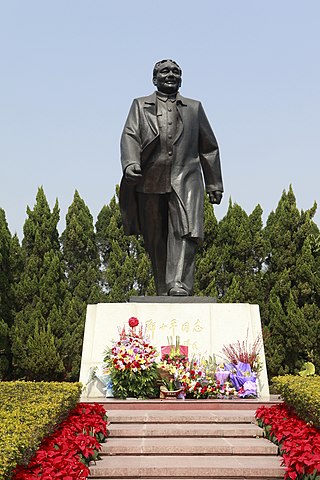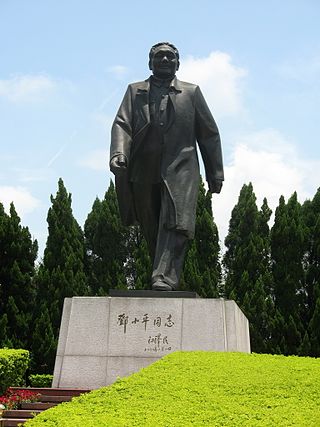
Deng Xiaoping was a Chinese revolutionary and statesman who served as the paramount leader of the People's Republic of China (PRC) from December 1978 to November 1989. After Chinese Communist Party chairman Mao Zedong's death in 1976, Deng rose to power and led China through its process of Reform and Opening Up and the development of the country's socialist market economy. Deng developed a reputation as the "Architect of Modern China" and his ideological contributions to socialism with Chinese characteristics are described as Deng Xiaoping Theory.

Maoism, officially called Mao Zedong Thought, is a variety of Marxism–Leninism that Mao Zedong developed while trying to realize a socialist revolution in the agricultural, pre-industrial society of the Republic of China and later the People's Republic of China. A difference between Maoism and traditional Marxism–Leninism is that a united front of progressive forces in class society would lead the revolutionary vanguard in pre-industrial societies rather than communist revolutionaries alone. This theory, in which revolutionary praxis is primary and ideological orthodoxy is secondary, represents urban Marxism–Leninism adapted to pre-industrial China. Later theoreticians expanded on the idea that Mao had adapted Marxism–Leninism to Chinese conditions, arguing that he had in fact updated it fundamentally and that Maoism could be applied universally throughout the world. This ideology is often referred to as Marxism–Leninism–Maoism to distinguish it from the original ideas of Mao.

Hu Yaobang was a Chinese politician who was a high-ranking official of the People's Republic of China. He held the top office of the Chinese Communist Party (CCP) from 1981 to 1987, first as Chairman from 1981 to 1982, then as General Secretary from 1982 to 1987. After the Cultural Revolution (1966–1976), Hu rose to prominence as a close ally of Deng Xiaoping, the paramount leader of China at the time.

Hua Guofeng was a Chinese politician who served as Chairman of the Chinese Communist Party and Premier of China. The designated successor of Mao Zedong, Hua held the top offices of the government, party, and the military after the deaths of Mao and Premier Zhou Enlai, but was gradually forced out of supreme power by a coalition of party leaders between December 1978 and June 1981, and subsequently retreated from the political limelight, though still remaining a member of the Central Committee until 2002.

Chen Yun was a Chinese revolutionary leader who was one of the most influential leaders of the People's Republic of China during the 1980s and 1990s and one of the major architects and important policy makers for the reform and opening up period, alongside Deng Xiaoping. He was also known as Liao Chenyun (廖陈云), as he took his uncle's family name when he was adopted by him after his parents died.
From November 1978 to December 1979, thousands of people put up "big character posters" on a long brick wall of Xidan Street, Xicheng District of Beijing, to protest about the political and social issues of China; the wall became known as the Democracy Wall. Under acquiescence of the Chinese government, other kinds of protest activities, such as unofficial journals, petitions, and demonstrations, were also soon spreading out in major cities of China. This movement can be seen as the beginning of the Chinese Democracy Movement. It is also known as the "Democracy Wall Movement". This short period of political liberation was known as the "Beijing Spring".

The time period in China from the death of Mao Zedong in 1976 until the 1989 Tiananmen Square protests and massacre is often known as Dengist China. In September 1976, after Chairman Mao Zedong's death, the People's Republic of China was left with no central authority figure, either symbolically or administratively. The Gang of Four was purged, but new Chairman Hua Guofeng insisted on continuing Maoist policies. After a bloodless power struggle, Deng Xiaoping came to the helm to reform the Chinese economy and government institutions in their entirety. Deng, however, was conservative with regard to wide-ranging political reform, and along with the combination of unforeseen problems that resulted from the economic reform policies, the country underwent another political crisis, culminating in the crackdown of massive pro-democracy protests in Tiananmen Square.
Liu Binyan was a Chinese author, journalist, and political dissident.
The history of the People's Republic of China details the history of mainland China since 1 October 1949, when CCP chairman Mao Zedong proclaimed the People's Republic of China (PRC) from atop Tiananmen, after a near complete victory (1949) by the Chinese Communist Party (CCP) in the Chinese Civil War. The PRC is the most recent political entity to govern mainland China, preceded by the Republic of China and thousands of years of monarchical dynasties. The paramount leaders have been Mao Zedong (1949–1976); Hua Guofeng (1976–1978); Deng Xiaoping (1978–1989); Jiang Zemin (1989–2002); Hu Jintao (2002–2012); and Xi Jinping.

Deng Xiaoping Theory, also known as Dengism, is the series of political and economic ideologies first developed by Chinese leader Deng Xiaoping. The theory does not reject Marxism–Leninism or Maoism, but instead claims to be an adaptation of them to the existing socioeconomic conditions of China.
The history of the Chinese Communist Party began with its establishment in July 1921. A study group led by Peking University professors Chen Duxiu and Li Dazhao to discuss Marxism, led to intellectuals officially founding the Chinese Communist Party (CCP) in July 1921. In 1923, Sun Yat-sen invited the CCP to form a United Front, and to join his Nationalist Party (GMD) in Canton for training under representatives of the Communist International, the Soviet Union's international organization. The Soviet representatives reorganized both parties into Leninist parties. Rather than the loose organization that characterized the two parties until then, the Leninist party operated on the principle of democratic centralism, in which the collective leadership set standards for membership and an all-powerful Central Committee determined the party line, which all members must follow.

The Maoist Communist Party of China (MCPC) is an underground communist party in China adhering to Marxism–Leninism–Maoism. The party was established in 2008 by Chinese leftists against economic reforms pursued by the Chinese Communist Party (CCP). Its founders were arrested in Chongqing in 2009.
Socialism with Chinese characteristics is a set of political theories and policies of the Chinese Communist Party (CCP) that are seen by their proponents as representing Marxism–Leninism adapted to Chinese circumstances and specific time periods, consisting of Deng Xiaoping Theory, Three Represents, Scientific Outlook on Development, and Xi Jinping Thought. According to CCP doctrine, Xi Jinping Thought is considered to represent Marxist–Leninist policies suited for China's present condition while Deng Xiaoping Theory was considered relevant for the period when it was formulated.
The Chinese Communist Party (CCP) frames its ideology as Marxism adapted to the historical context of China, often expressing it as socialism with Chinese characteristics. Major ideological contributions of the CCP's leadership are viewed as "Thought" or "Theory," with "Thought" carrying greater weight. Influential concepts include Mao Zedong Thought, Deng Xiaoping Theory, and Xi Jinping Thought. Other important concepts include the socialist market economy, Jiang Zemin's idea of the Three Represents, and Hu Jintao's Scientific Outlook on Development.
The Peaceful Evolution theory or Peaceful Evolution in international political thought refers to a theory of effecting political transformation of the Chinese and Vietnamese socialist systems by peaceful means. The theory was primarily espoused in the United States.

Liu Shaoqi was a Chinese revolutionary and politician. He was the chairman of the Standing Committee of the National People's Congress from 1954 to 1959, first-ranking vice chairman of the Chinese Communist Party from 1956 to 1966, and the chairman of the People's Republic of China, the head of state from 1959 to 1968. He was considered to be a possible successor to Mao Zedong, but was purged during the Cultural Revolution.
Neoauthoritarianism, also known as Chinese Neoconservativism or New Conservatism since the 1990s, is a current of political thought within the People's Republic of China (PRC), and to some extent the Chinese Communist Party (CCP), that advocates a powerful state to facilitate market reforms. It has been described as right-wing, classically conservative even if elaborated in self-proclaimed "Marxist" theory.

Boluan Fanzheng refers to a period of significant sociopolitical reforms starting with the accession of Deng Xiaoping to the paramount leadership in China, replacing Hua Guofeng, who had been appointed as Mao Zedong's successor before Mao's death in 1976. During this period, a far-reaching program of reforms was undertaken by Deng and his allies to "correct the mistakes of the Cultural Revolution", and restore order in the country. The start of the Boluan Fanzheng period is regarded as an inflection point in Chinese history, with its cultural adjustments later proven to be the bedrock upon which the parallel economic reform and opening up could take place. As such, aspects of market capitalism were successfully introduced to the Chinese economy, giving rise to a period of growth often characterized as one of the most impressive economic achievements in human history.

Deng Xiaoping's southern tour, or 1992 southern tour, or simply Nanxun was the tour of Deng Xiaoping, the former Paramount leader of China, in southern China, including in Shenzhen, Zhuhai, Guangzhou and Shanghai, from January 18 to February 21, 1992. The talks and remarks made by Deng during the tour resumed and reinforced the implementation of his "Reforms and Opening-up" program in mainland China, which had come to a halt after the military crackdown on 1989 Tiananmen Square protests ordered by Deng himself. The 1992 Southern Tour is widely regarded as a critical point in the modern history of China, as it saved the Chinese economic reform as well as the capital market, and preserved the stability of the society.
The Seven-Thousand Cadres Conference (七千人大会) was one of the largest work conferences ever of the Chinese Communist Party (CCP). It took place in Beijing, China, from 11 January to 7 February 1962. The conference was attended by over 7,000 party officials nationwide, focusing on the issues of the Great Leap Forward which resulted in the deaths of tens of millions in the Great Chinese Famine. CCP chairman Mao Zedong made self-criticism during the conference, after which he took a semi-retired role, leaving future responsibilities to Chinese President Liu Shaoqi and Vice Premier Deng Xiaoping.











